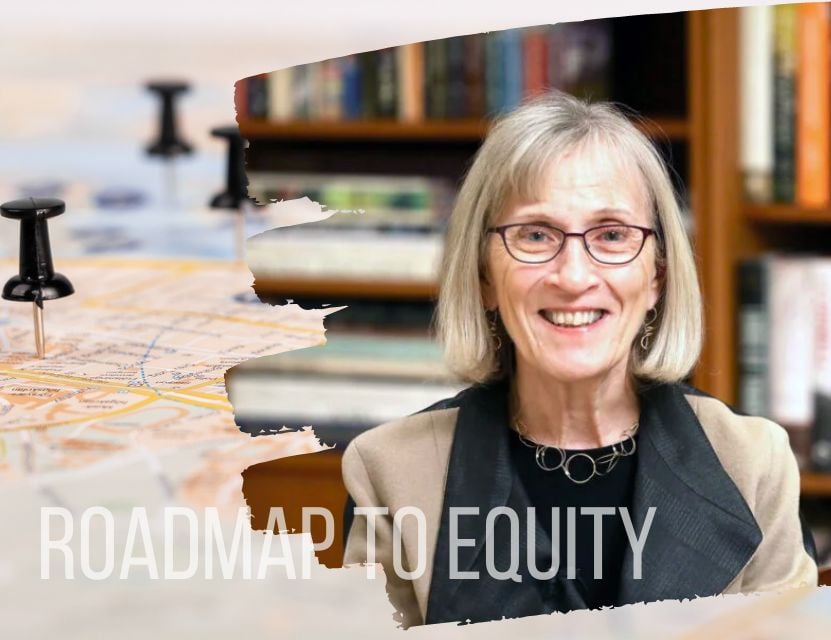Women have long battled the road to equal rights.
Passed by the U.S. Congress on June 4, 1919, and ratified on August 18, 1920, the 19th amendment granted women the right to vote. This was a landmark win shifting our society towards equality.
In 1964, Title VII of the Civil Rights Act barred discrimination in employment on the basis of race and sex.
A decade later, in 1974, the year before I was born, the Equal Credit Opportunity Act prohibited discrimination in consumer credit practices on the basis of sex, race, marital status, religion, national origin, age, or receipt of public assistance.
Fast forward to 2018, and we're in the thick of a new revolution for women. But in my generation and in my lifetime, I want this movement to be about equality for ALL women.
It's time we look beyond white women.
I know. You see me and think... she's a white, privileged, educated woman. And yes, that's true. I will never ever know what it means to be a black woman.
What I am qualified to say is it's about time that Black women get their fair share.
Before I even give you the data, let's clear the air on the "meritocracy" argument. Everything we do should be based on merit. And I agree. I don't reward people for substandard work...and irrespective of race, there are people (men, women, black and white) who don't perform. But to be brutally honest, black women who do great work and have earned that merit, still don't get paid what they should. As a leader in many companies, I was a witness to this more than once and it's time for this to change.
August 7 is Black Women’s Equal Pay Day.
That means Black women had to work all of 2017 and up to this day in 2018 to catch up with what white men earned in 2017 alone. On average, Black women are paid 38% less than white men and 21% less than white women.
This is just unacceptable.
The LeanIn.org Black Equal Pay Day survey in partnership with Survey Monkey and the National Urban League found some very sobering statistics. 50% of Americans are not aware of the pay gaps between Black women and white women, and hiring managers are similarly. Please take a moment to let these numbers sync in and then share them with someone who needs to know.
Even when you control for factors like education, experience, location and occupation, there's still a gap.
The pay gap starts early. When presented with information that Black women on average are paid 38% less than white men, 72% of Americans think that's not fair.
I'll say it again. It's not unfair. It's unacceptable.
There's just one key milestone in the women's movement I think worth mentioning, but it won't be the last. On January 21, 2017, in response to numerous factors, activists around the USA organized a Women's March to advocate for women's rights. Despite some ideological conflicts between event organizers over inclusion and diversity, the nationwide protest rapidly spread globally. Upwards of 3 million turned out in the USA, marking it one of the largest and most peaceful protests in American history.
This OP-ED piece is about not about politics or party. It's about the movement in support of inclusion. It's about the society and culture we are shaping in unprecedented times. Our sons, daughters, and the next generation deserve better. It's about driving a more equal world, one where women -- white and Black women can be successful.
My question to you is what are you doing about it?
Lean in, speak up, take action, and do your part to help Black women.
Katie Mehnert is the Founder and CEO of Pink Petro and Experience Energy. She's also Founder of Lean In Energy, a mentoring community that helps women in energy achieve their ambitions. Lean In Energy matches mentors and mentees and brings mentoring and advocacy programs like Equal Pay Day, Black Equal Pay Day and Latina Equal Pay Day to the energy community. Lean In Energy is an independent organization, affiliated with LeanIn.Org, which works closely with LeanIn.Org to further its mission and is licensed by LeanIn.Org to use the ‘Lean In’ name.
The full research and data may be found at www.leanin.org.
- Footnotes
- Ariane Hegewisch and Emma Williams-Baron, “The Gender Wage Gap: 2016; Earnings Differences by Gender, Race, and Ethnicity,” IWPR #C459 (September 2017), https://iwpr.org/publications/gender-wage-gap-2016-earnings-differences-gender-race-ethnicity/. Black women are paid $0.625 for every $1 that white men earn, leading to a pay gap for Black women of 37.5%.
- SurveyMonkey and Lean In conducted two polls among a national sample of adults in the U.S. age 18 and older. The first was conducted June 29 – July 4, 2018 among 2,950 adults and the second was conducted July 13–18, 2018 among 4,217 adults. The modeled error estimate for both surveys is +/- 2 percentage points. Data have been weighted for age, race, sex, education, and geography using the Census Bureau’s American Community Survey to reflect the demographic composition of the United States age eighteen and over. Learn more.
- Ibid. 45% of hiring managers reported that they are unaware of the gap.
- Ibid.
- Economic Policy Institute, “Black women have to work 7 months into 2017 to be paid the same as white men in 2016” (July 28, 2017), https://www.epi.org/blog/black-women-have-to-work-7-months-into-2017-to-be-paid-the-same-as-white-men-in-2016/.
- AAUW, The Simple Truth About the Gender Pay Gap (Fall 2017), http://www.aauw.org/aauw_check/pdf_download/show_pdf.php?file=The-Simple-Truth; Bureau of Labor Statistics, “Weekly and hourly earnings data from the Current Population Survey” (July 2018), https://data.bls.gov/PDQWeb/le.
- SurveyMonkey/Lean In poll, June 29-July 4, 2018.
- National Partnership for Women & Families, “Black Women and the Wage Gap” (April 2018), http://www.nationalpartnership.org/research-library/workplace-fairness/fair-pay/african-american-women-wage-gap.pdf
- SurveyMonkey/Lean In poll conducted March 22–27, 2018, among a national sample of 7,461 adults, including 4,928 who are employed. The modeled error estimate is +/-1.5 percentage points among the full sample. Data have been weighted to reflect the demographic composition of the United States age 18 and over. Learn more.
- National Women’s Law Center, “The Lifetime Wage Gap, State by State” (April 2018), https://nwlc.org/resources/the-lifetime-wage-gap-state-by-state/.
- National Partnership for Women & Families, “Black Women and the Wage Gap” (April 2018), http://www.nationalpartnership.org/research-library/workplace-fairness/fair-pay/african-american-women-wage-gap.pdf; National Women’s Law Center, “The Lifetime Wage Gap, State by State” (April 2018), https://nwlc.org/resources/the-lifetime-wage-gap-state-by-state/
- Ariane Hegewisch and Emma Williams-Baron, “The Gender Wage Gap: 2016; Earnings Differences by Gender, Race, and Ethnicity,” IWPR #C459 (September 2017), https://iwpr.org/publications/gender-wage-gap-2016-earnings-differences-gender-race-ethnicity/. Black women are paid $0.625 for every $1 that white men earn, leading to a pay gap for Black women of 37.5%.




